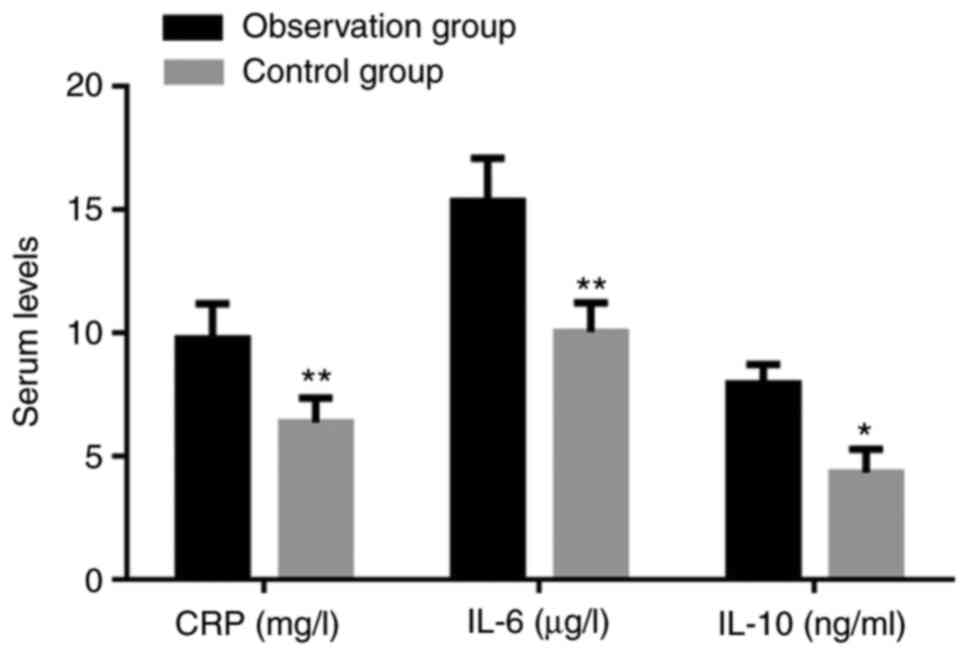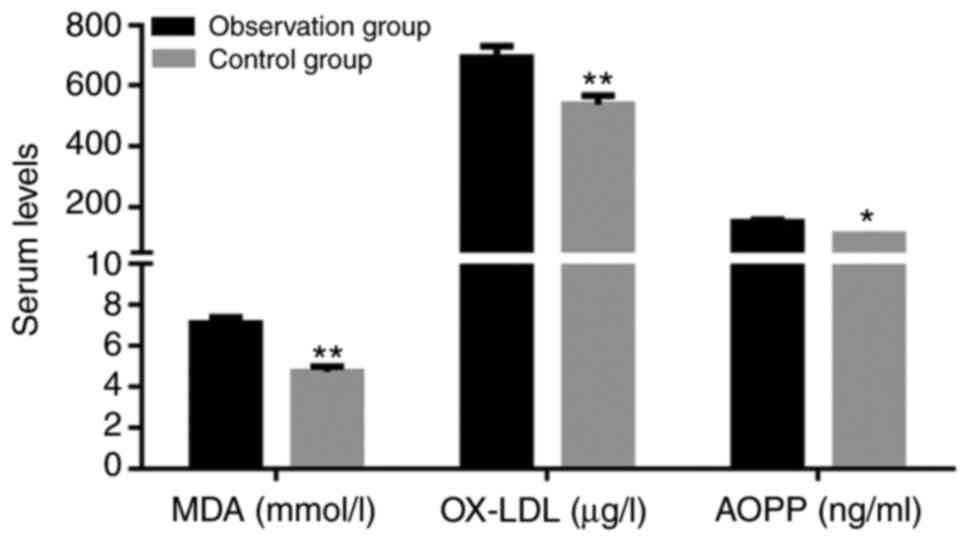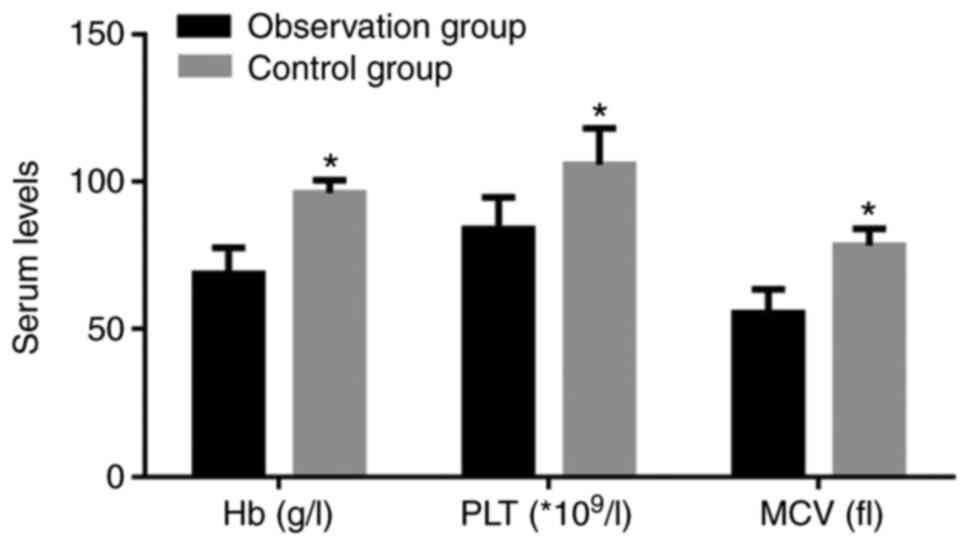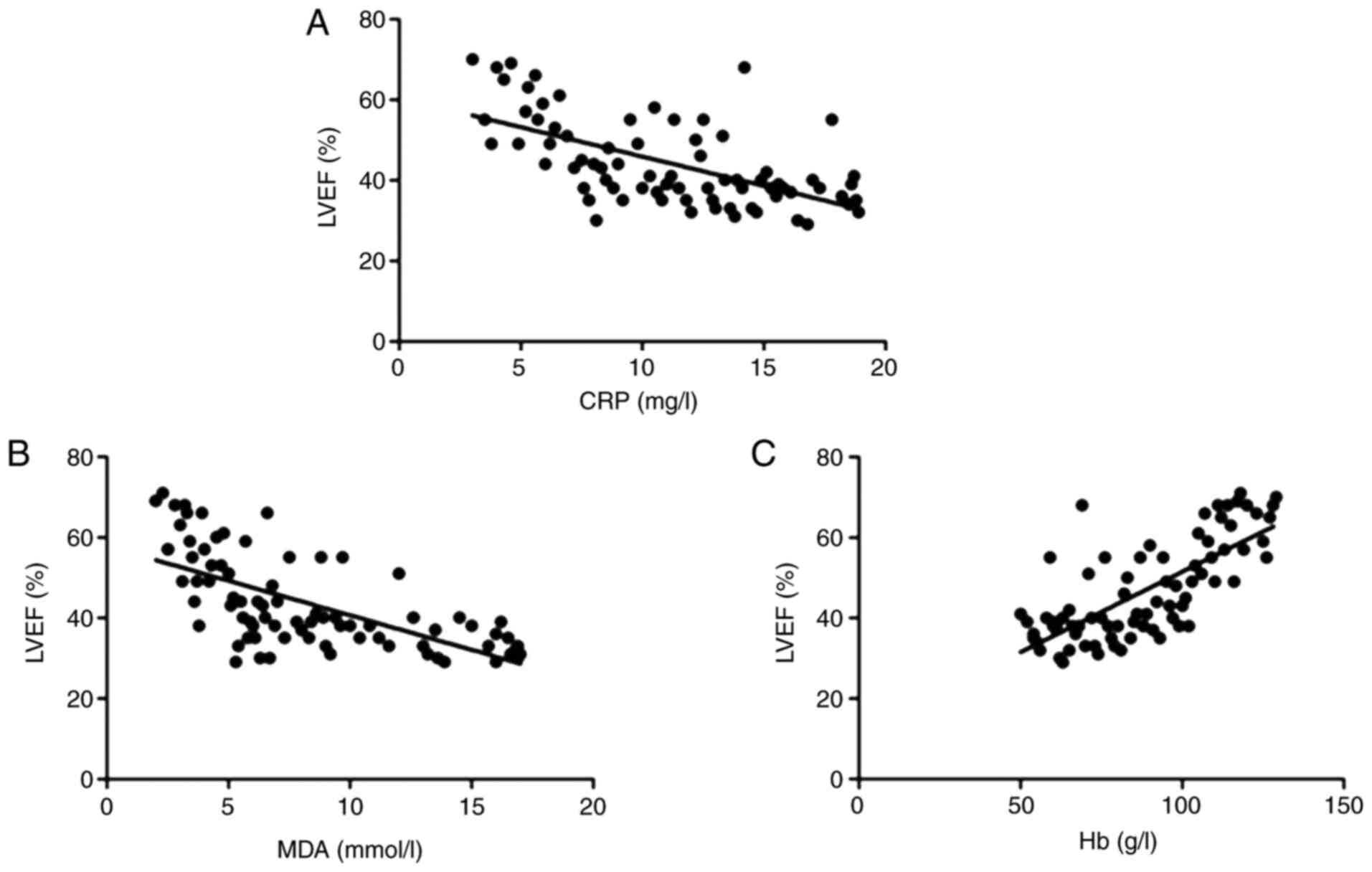|
1
|
Foley RN, Parfrey PS and Sarnak MJ:
Clinical epidemiology of cardiovascular disease in chronic renal
disease. Am J Kidney Dis. 32 (Suppl 3):S112–S119. 1998.PubMed/NCBI View Article : Google Scholar
|
|
2
|
Usberti M, Gerardi GM, Gazzotti RM,
Benedini S, Archetti S, Sugherini L, Valentini M, Tira P, Bufano G,
Albertini A, et al: Oxidative stress and cardiovascular disease in
dialyzed patients. Nephron. 91:25–33. 2002.PubMed/NCBI View Article : Google Scholar
|
|
3
|
Himmelfarb J, Stenvinkel P, Ikizler TA and
Hakim RM: The elephant in uremia: Oxidant stress as a unifying
concept of cardiovascular disease in uremia. Kidney Int.
62:1524–1538. 2002.PubMed/NCBI View Article : Google Scholar
|
|
4
|
Witko-Sarsat V, Friedlander M,
Capeillère-Blandin C, Nguyen-Khoa T, Nguyen AT, Zingraff J, Jungers
P and Descamps-Latscha B: Advanced oxidation protein products as a
novel marker of oxidative stress in uremia. Kidney Int.
49:1304–1313. 1996.PubMed/NCBI View Article : Google Scholar
|
|
5
|
Morena M, Cristol JP and Canaud B: Why
hemodialysis patients are in a prooxidant state? What could be done
to correct the pro/antioxidant imbalance. Blood Purif. 18:191–199.
2000.PubMed/NCBI View Article : Google Scholar
|
|
6
|
Hirayama A, Nagase S, Gotoh M, Takemura K,
Tomida C, Ueda A, Aoyagi K, Terao J and Koyama A: Hemodialysis does
not influence the peroxidative state already present in uremia.
Nephron. 86:436–440. 2000.PubMed/NCBI View Article : Google Scholar
|
|
7
|
Miyata T, Ueda Y, Yamada Y, Izuhara Y,
Wada T, Jadoul M, Saito A, Kurokawa K and van Ypersele de Strihou
C: Accumulation of carbonyls accelerates the formation of
pentosidine, an advanced glycation end product: Carbonyl stress in
uremia. J Am Soc Nephrol. 9:2349–2356. 1998.PubMed/NCBI
|
|
8
|
Zimmermann J, Herrlinger S, Pruy A,
Metzger T and Wanner C: Inflammation enhances cardiovascular risk
and mortality in hemodialysis patients. Kidney Int. 55:648–658.
1999.PubMed/NCBI View Article : Google Scholar
|
|
9
|
Riella MC: Malnutrition in dialysis:
Malnourishment or uremic inflammatory response? Kidney Int.
57:1211–1232. 2000.PubMed/NCBI View Article : Google Scholar
|
|
10
|
Steinberg D, Parthasarathy S, Carew TE,
Khoo JC and Witztum JL: Beyond cholesterol. Modifications of
low-density lipoprotein that increase its atherogenicity. N Engl J
Med. 320:915–924. 1989.PubMed/NCBI View Article : Google Scholar
|
|
11
|
Mak S, Lehotay DC, Yazdanpanah M, Azevedo
ER, Liu PP and Newton GE: Unsaturated aldehydes including
4-OH-nonenal are elevated in patients with congestive heart
failure. J Card Fail. 6:108–114. 2000.PubMed/NCBI
|
|
12
|
Cracowski JL, Devillier P, Durand T,
Stanke-Labesque F and Bessard G: Vascular biology of the
isoprostanes. J Vasc Res. 38:93–103. 2001.PubMed/NCBI View Article : Google Scholar
|
|
13
|
Schettler V, Wieland E, Methe H,
Schuff-Werner P and Müller GA: Oxidative stress during dialysis:
Effect on free radical scavenging enzyme (FRSE) activities and
glutathione (GSH) concentration in granulocytes. Nephrol Dial
Transplant. 13:2588–2593. 1998.PubMed/NCBI View Article : Google Scholar
|
|
14
|
Uchida K: Role of reactive aldehyde in
cardiovascular diseases. Free Radic Biol Med. 28:1685–1696.
2000.PubMed/NCBI View Article : Google Scholar
|
|
15
|
Helmke A and von Vietinghoff S:
Extracellular vesicles as mediators of vascular inflammation in
kidney disease. World J Nephrol. 5:125–138. 2016.PubMed/NCBI View Article : Google Scholar
|
|
16
|
Fiorillo C, Oliviero C, Rizzuti G, Nediani
C, Pacini A and Nassi P: Oxidative stress and antioxidant defenses
in renal patients receiving regular haemodialysis. Clin Chem Lab
Med. 36:149–153. 1998.PubMed/NCBI View Article : Google Scholar
|
|
17
|
Canaud B, Cristol J, Morena M,
Leray-Moragues H, Bosc J and Vaussenat F: Imbalance of oxidants and
antioxidants in haemodialysis patients. Blood Purif. 17:99–106.
1999.PubMed/NCBI View Article : Google Scholar
|
|
18
|
Siems WG, Sommerburg O and Grune T:
Erythrocyte free radical and energy metabolism. Clin Nephrol. 53
(Suppl):S9–S17. 2000.PubMed/NCBI
|
|
19
|
Siems W, Carluccio F, Grune T, Jakstadt M,
Quast S, Hampl H and Sommerburg O: Elevated serum concentration of
cardiotoxic lipid peroxidation products in chronic renal failure in
relation to severity of renal anemia. Clin Nephrol. 58 (Suppl
1):S20–S25. 2002.PubMed/NCBI
|
|
20
|
Zheng Y, Yang X, Zhou Q, Huang Y, Zhang F
and Wang L: Effect of left ventricular hypertrophy and deformation
on cardiac function in patients with uremia cardiomyopathy by using
quantitative speckle tracking technology. Zhong Nan Da Xue Xue Bao
Yi Xue Ban. 42:400–405. 2017.PubMed/NCBI View Article : Google Scholar : (In Chinese).
|


















